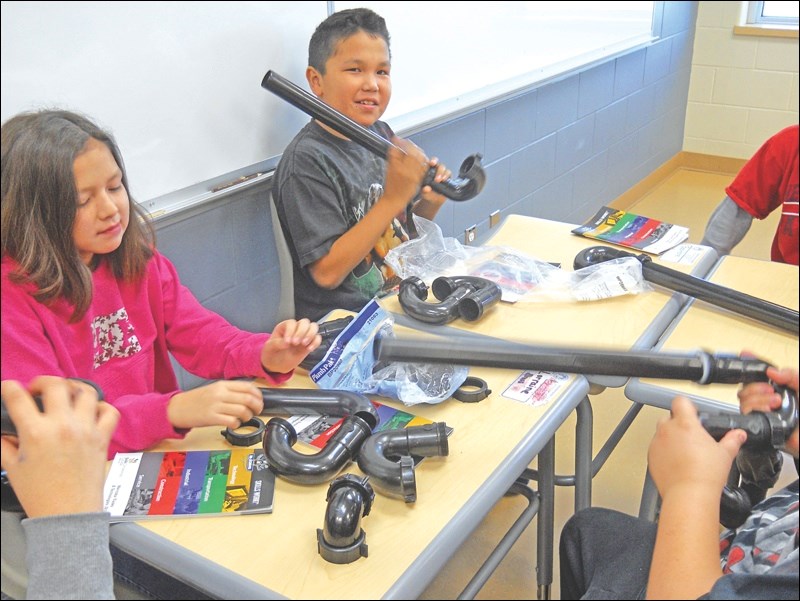Northern Manitoba is in no way exempt from the province’s well-documented skills shortage.
That’s where Alexandra Béasse comes in.
As career development coordinator for school divisions in Flin Flon, Cranberry Portage and The Pas, she assists students with job readiness and helps connect them with trades opportunities in the region.
“They need our kids to choose trades as a viable option for their career path,” says Béasse, referring to major industrial employers in northern Manitoba.
Under a provincial grant, the Flin Flon-based Beasse and two other career development coordinators work with students across northern Manitoba.
Béasse is the coordinator for Flin Flon School Division, Kelsey School Division in The Pas and Area 4 of the Frontier School Division, which includes Cranberry Portage.
She works with the newly formed Northern Consortium (unofficially called the Highway 10 Consortium), which includes the Flin Flon, Kelsey and Frontier school divisions as well as school divisions in Thompson and Swan River.
Also part of the consortium are the major regional employers of Hudbay (Flin Flon and Snow Lake), Tolko (The Pas), Vale (Thompson) and LP (Swan River), along with Apprenticeship Manitoba and Manitoba’s Ministry of Education.
Tyson MacGillivray, assistant superintendent for Frontier School Division and Béasse’s supervisor, says the career development coordinators in the North aim to engage students in grades 5 to 12, with a particular focus on grades 5 to 8.
As he sees it, the goal is to encourage them “to start thinking more about careers, exposing them to different experiences, and introducing them to different industries available in their areas.”
Given that Béasse’s is a new position – she started this school year – her role is evolving through discussions with consortium members.
She says the focus has shifted over the school year from trades to career development in general, though trades remain a central part of the program.
Béasse notes that each coordinator’s mandate is slightly different, based on his or her skill set and the needs of the regions they serve.
For Béasse, a major focus is essential skill development, career exploration and personal awareness and management, especially for students at risk and those with special needs.
“I spent a lot of years working with disabled and marginalized people, so I have a real passion for that group,” says Beasse, who holds a master’s degree in social work with a specialization in community development.
Since her role is currently part-time (18 hours a week), Béasse says her aim is to maximize her reach by training trainers and offering seminars rather than working one-on-one with students or teachers.
She has produced a series of handouts targeted at teens and their parents on life skills, such as developing and sticking to a plan, and learning to rebound from failures and disappointments.
“I hate seeing people stuck on the edges and not engaging in life to its fullest,” says Béasse. “I really want everyone to have the same benefits.”
For students pursuing academic pathways, building connections with industry is key as well, according to Béasse.
She says its helpful for youth to understand the skills that are needed in major northern industries, such as mining and forestry, so they can explore professional careers that will allow them to stay in, or return to, their home communities if they wish.
During her tenure as career development coordinator, Béasse has developed a PowerPoint presentation called Fred’s Story.
The presentation documents the real-life experiences of a young man who struggled in school but went on to create a successful life through essential skill development, determination and a strong support network.
“He is very marginal, with multiple disabilities, mental health and addictions issues,” Béasse says, “and yet [the presentation explores] what he learned from school even though he didn’t earn credits.”
In order to further foster students’ understanding of vocational careers available in the North, Béasse is helping organize a program called Introduction to Careers in the North. It’s based on a program developed by Grant Krueger, technical vocational coordinator for Frontier School Division.
The one-day program is targeted at students in grades 5 to 8 and was piloted in Moose Lake in early December. A similar program will be launched at École McIsaac School in February.
The concept is to give students insights into trades-related skills, from welding to cosmetology to firefighting. The goal is to light a spark in some of the students.
“It gives them something to strive to achieve,” MacGillivray says.
Béasse says a number of other initiatives for local students are in the pipeline for 2016, including a visit from First Class Training Centre, a vocational institution for the trucking industry.
The centre plans to bring its tractor trailer simulator to Flin Flon for two days in February. The first day will be open to local students; the second day for local residents interested in careers in the trucking industry.
So has the career development initiative been successful so far? MacGillivray thinks so.
“There are a lot more opportunities for kids at the school level to engage in hands-on activities and in careers in general,” he says. “[The coordinators] are in schools constantly, engaging kids, getting them thinking.”
MacGillivray estimates that Béasse has engaged with about 1,000 students since her position began this school year.
While the consortium seems to be making progress, its funding is only slated for one year at this point.
“We are hoping it’s going to be continuous,” says MacGillivray, who noted there has been no indication the province would end the funding.
The three northern career development coordinators, along with six others working throughout the province, are funded by the $2 million Career Development Initiative Grant, unveiled in early 2015 by Manitoba’s
Ministry of Education and Advanced Learning.




